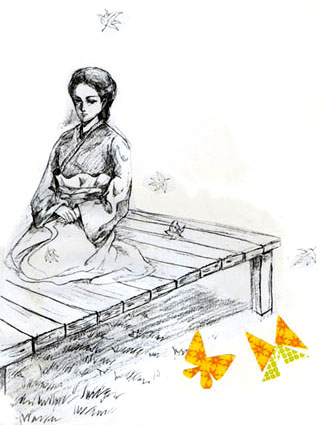The River Merchant's
Wife
"While
my hair was still cut straight across my forehead
I played about the front gate, pulling flowers.
You came by on bamboo stilts, playing horse,
You walked about my seat, playing with blue
plums.
And we went on living in the village of Chokan:
Two small people, without dislike or suspicion.
At fourteen
I married My Lord you.
I never laughed, being bashful.
Lowering my head, I looked at the wall.
Called to, a thousand times, I never looked
back.
At fifteen I
stopped scowling,
I desired my dust to be mingled with yours
Forever and forever and forever.
Why should I climb the lookout?
At sixteen you
departed,
You went into far Ku-to-en, by the river of
swirling eddies,
And you have been gone five months.
The monkeys make sorrowful noise overhead.
You dragged
your feet when you went out.
By the gate now, the moss is grown, the different
mosses,
Too deep to clear them away!
The leaves fall early this autumn, in wind.
The paired butterflies are already yellow with
August
Over the grass in the West garden;
They hurt me. I grow older.
If you are coming down through the narrows of
the river Kiang,
Please let me know beforehand,
And I will come out to meet you
As far as Cho-fo-Sa."

The River Merchant's
wife is a Chinese poem written by an 8th century
Poet, Li Bai, and it was translated into English
a century later by Ezra Pound, an 18th century
English poet. Human emotions , such as the human
experience of sorrow at separation, and the
human experience of love can transcend time
and Ezra Pound demonstrated that poetic image
does not lose anything in translation between
languages nor was it bound by time, but poetry
can be effectively communicated through time
and across cultures, accruing meaning in the
process.
However, Pound's
work has significance not only for its
cross- cultural innovations, but for the "cross-chronological"
breakthrough notion that the human response
to the world links us all, so that an Englishman
in the twentieth century can share and learn
from the human experience of an eighth century
Chinese river-merchant's wife.
|
 |